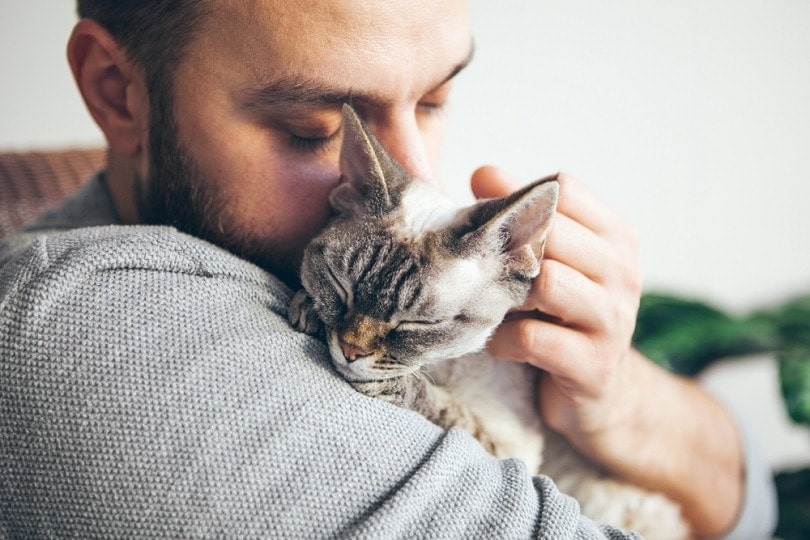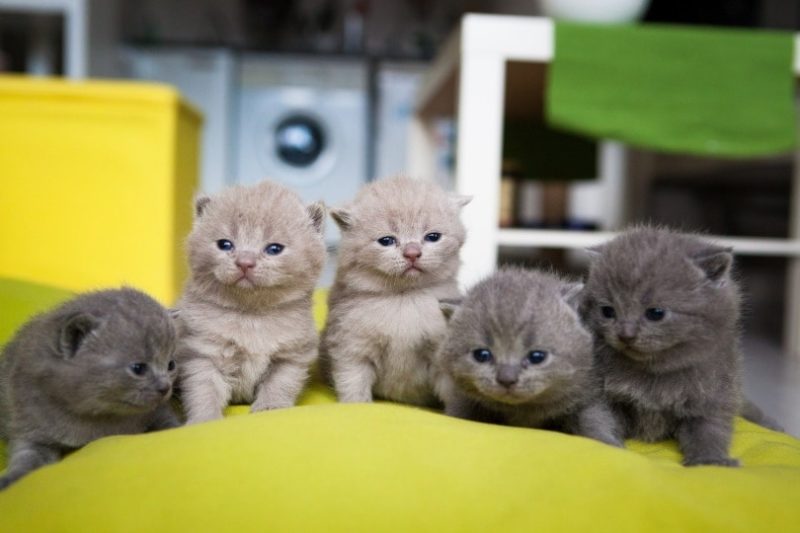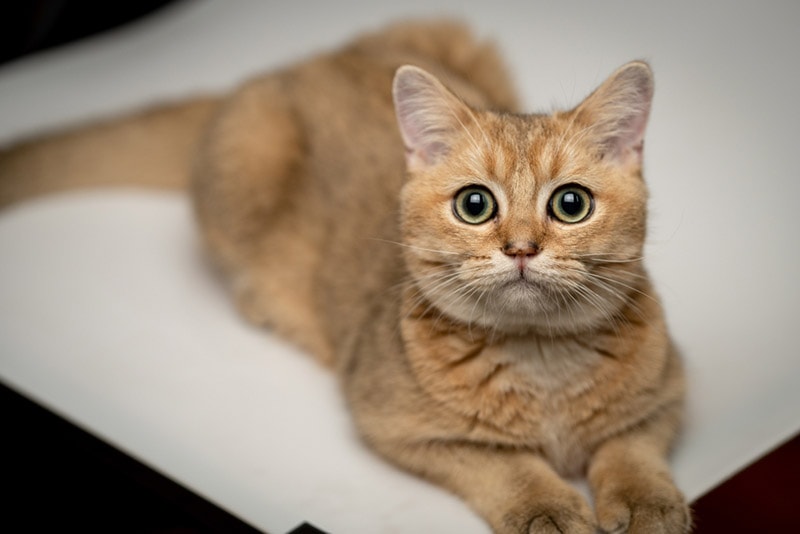Do Cats Eat Guinea Pigs? Vet-Reviewed Cohabitation Facts & FAQ
Updated on
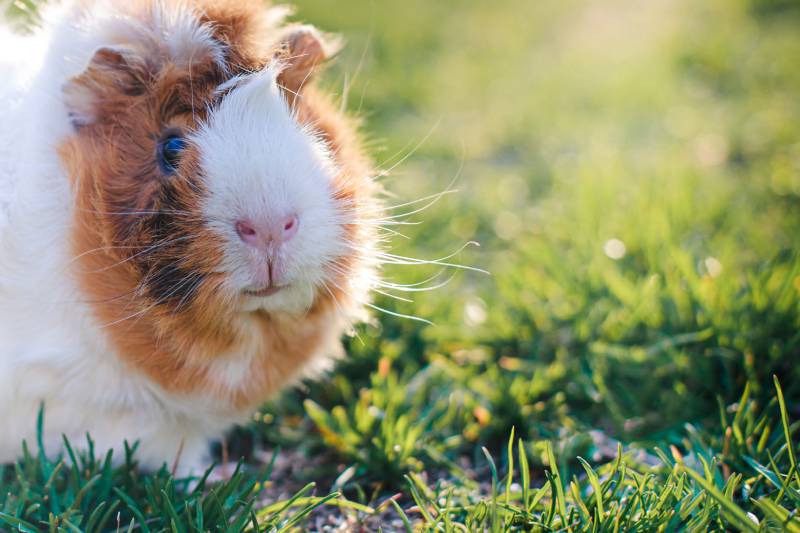
Click to Skip Ahead
Not all pet pairings end in friendship. Cats, for example, don’t tend to get along with, and may try to eat prey animals like guinea pigs, rabbits, hamsters, and basically any pet you house in a cage or tank. It’s easy to forget that our sweet little house kitties are born predators, and their predatory instincts tell them such critters are prey and food. It’s disturbing for us, but remember that cats simply operate by nature’s rules, and hunting is as natural as breathing is to them.
Owning a cat and guinea pig at the same time can be challenging for a number of reasons and we would generally advise against keeping both in the same household. Cats can sometimes be trained to ignore the guinea pig and coexist peacefully, but there’s always that lingering predatory tickle in their minds with regard to prey creatures. It’s a danger that requires constant vigilance, both by you and your guinea pig.
If you’d like to learn more about cats and guinea pigs, you’re in the right place. Down below, we’ll be talking a bit more about each of their places in the animal kingdom, and tips on protecting your guinea pig from your cat.
Cats in the Wild
Cats are obligate carnivores, driven by millions of years of evolution to hunt prey like rodents, birds, lizards, fish, and more. On occasion, they’ve been known to eat bugs as well, but they don’t make a habit of it. Unlike dogs, cats gain virtually no nutritional benefit from carbohydrates. Rather, they gain the bulk of their nutrients through protein and fat.
Because of their high protein needs, cats have become honed killing machines. Their keen nose, stealthy dexterity, low-light vision, and need to chase are all tuned for one purpose: hunting and killing smaller animals. As cat owners know, this predatory instinct manifests in many ways, from chasing plastic bags and yarn, to stalking and pouncing on roaches.
An important final note about cats is that they’re solitary hunters that prefer to be alone unless seeking out a mate or caring for young. They have no family structure similar to our own and do their own thing regardless of the setting. Siblings will often happily co-exist, and many will enjoy the companionship of another cat, but by their nature, they will not necessarily seek or yearn for feline company.
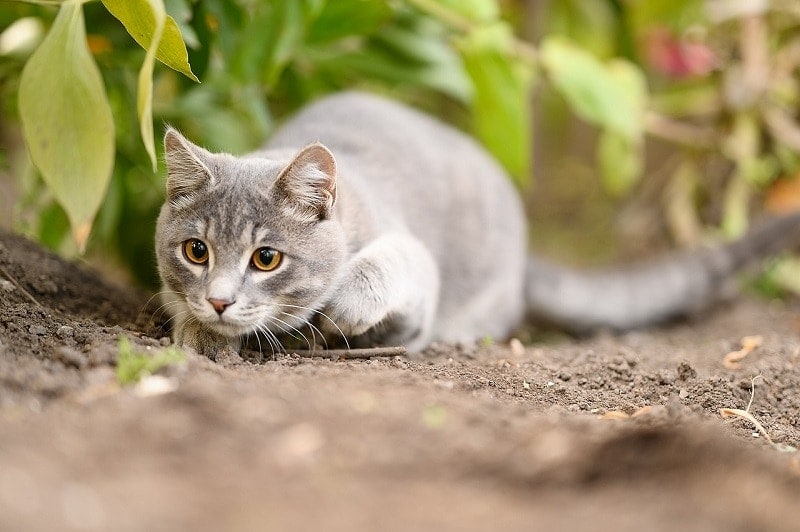
Guinea Pigs in the Wild
In stark contrast to cats, guinea pigs are social animals that live in small family units of 3 to 12 guinea pigs per group. These groups are varied and even form complex hierarchies. You see alpha guinea pig males dominating “lower” males, as well as claiming more land and mates. The guinea pigs we know and love trace back to the harsh South American mountains where they’ve adapted to survive amidst harsh weather and dangerous predators.
Guineas are adept at not only digging, which any owner knows, but rock climbing and long-distance running too. Because they’re prey animals, hunted by nearly every predator out there, guinea pigs are constantly on the move in the safety of numbers, and in the search for food. Specifically, plants of nearly any type. Because of their natural social structure, guinea pigs kept as pets should never be housed alone.
In another contrast to cats, guinea pigs are exclusively herbivorous and rely on plants for most of their food and water intake. Most leafy greens are largely water, after all. Two of the most essential nutrients for a guinea pig are fiber and vitamin C, which supports a healthy body and staves off scurvy.
Do Cats Eat Guinea pigs?
These days, cats are not going to encounter guinea pigs in the wild, unless they happen upon one that has escaped their enclosure, so they wouldn’t be considered part of a cat’s natural diet. However, a fast-moving, squeaky little creature like a guinea pig is likely to be pretty irresistible to a cat on the prowl.
If you have a cat that goes outdoors, you’ve no doubt been witness to their hunting escapades. Some cats are very primal, and will hunt, kill, and eat their prey. Others appear to have the hunting drive, but not necessarily the follow-through. Their instincts tell them to chase, pounce, and catch the prey, but thousands of years of domestication have made them forget why. So they play with the hapless creature, and often bring it to their humans as some sort of offering, alive or dead.
So the answer to the question “Do Cats Eat Guinea Pigs” is: Maybe. But even if they don’t eat a guinea pig, there is a high chance they will still kill it, because cats that aren’t voracious hunters are still unlikely to resist playing with your cute cavy, and that play is likely to end badly.
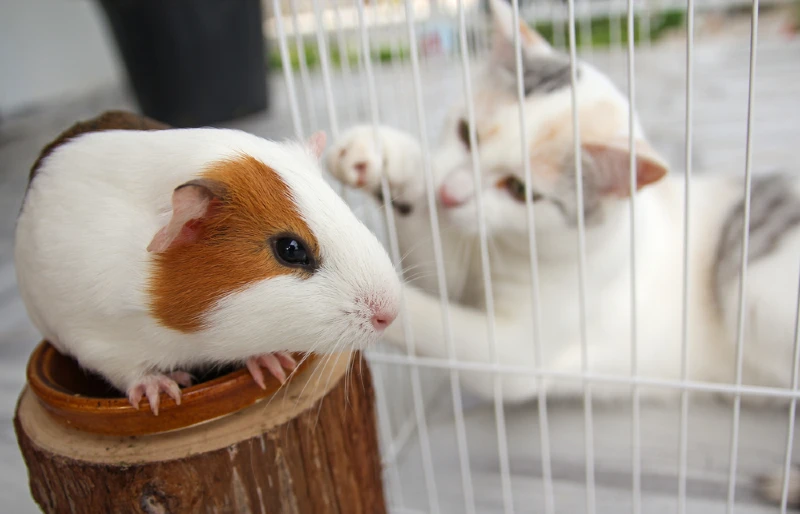
How to Protect Your Guinea Pig From Your Cat
Cats and guinea pigs are not an ideal mix, but it’s highly dependent on your cat’s temperament. Young, hyperactive kittens are definitely a no-go, but a more laid-back senior cat might work. To help keep your guinea pig safe from your cat, consider some of our handy tips below.
- Keep your guinea pig in a safe, secure enclosure when your cat is loose in your home.
- When letting your guinea pig out for some exercise or socialization, consider putting your cat in a crate or confined to a room.
- Even if your cat is restrained, watch them and your guinea pig for any alarming behavior.
- If possible, keep your guinea pig in a totally separate area of your home that your cat doesn’t have free access to.
A really important consideration when keeping these species together in one household is the invisible effects it may have. Whether they show it or not, your cat is aware of your cavy friends, and they are very much aware of your cat. This can mean that your cat is often switched onto hunting mode, alert and ready to pounce, which can actually be quite taxing for them. For your guinea pigs, knowing there is a cat about will keep them on high alert all the time. This could mean chronic stress or even sleep deprivation. So even if you don’t observe any obvious interactions between these two species, they will be having an effect on one another.
Picture living in a house, knowing there are Velociraptors outside. You might go about your day-to-day activities indoors, but you are constantly aware of, and in fear of, being eaten.
Conclusion
Cats naturally perceive guinea pigs as prey and will almost always hunt and kill them if left unsupervised together. Equally, guinea pigs will always perceive your cat as predatory, whether they show interest in them or not. While it can be possible for some cats to coexist with guinea pigs, you should always keep them physically separated from each other at all times to prevent accidents from occurring. If you currently have one or the other, consider the wellbeing of both species before putting them in the same home.
If you have a cat or cats and are desperate to add a pocket pet into your life, consider a rat. Although rats are a common prey species for cats, their confident and curious natures mean they coexist with felines much more happily, and in some (very carefully monitored) situations, can even form friendships.
Featured Image Credit: Lipatova Maryna, Shutterstock


